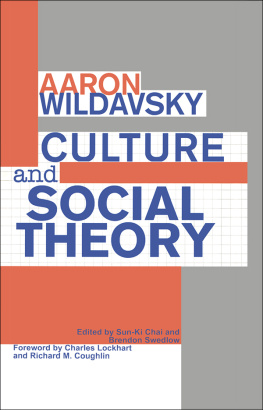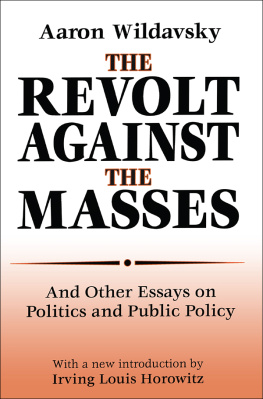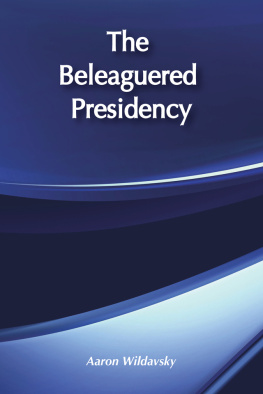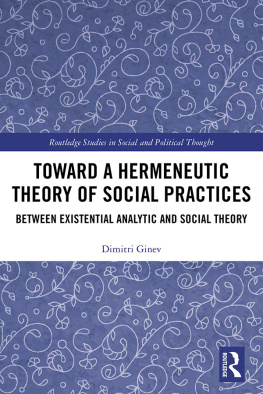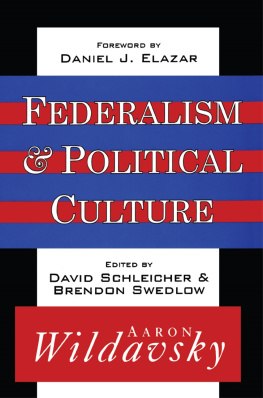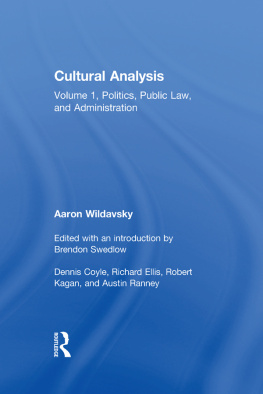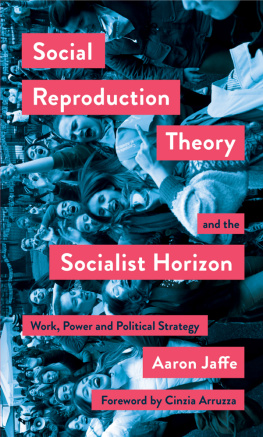Aaron Wildavsky - Culture and Social Theory
Here you can read online Aaron Wildavsky - Culture and Social Theory full text of the book (entire story) in english for free. Download pdf and epub, get meaning, cover and reviews about this ebook. City: London, year: 1996, publisher: Routledge, genre: Science / Art. Description of the work, (preface) as well as reviews are available. Best literature library LitArk.com created for fans of good reading and offers a wide selection of genres:
Romance novel
Science fiction
Adventure
Detective
Science
History
Home and family
Prose
Art
Politics
Computer
Non-fiction
Religion
Business
Children
Humor
Choose a favorite category and find really read worthwhile books. Enjoy immersion in the world of imagination, feel the emotions of the characters or learn something new for yourself, make an fascinating discovery.
- Book:Culture and Social Theory
- Author:
- Publisher:Routledge
- Genre:
- Year:1996
- City:London
- Rating:3 / 5
- Favourites:Add to favourites
- Your mark:
Culture and Social Theory: summary, description and annotation
We offer to read an annotation, description, summary or preface (depends on what the author of the book "Culture and Social Theory" wrote himself). If you haven't found the necessary information about the book — write in the comments, we will try to find it.
Aaron Wildavsky, along with Mary Douglas, identified what they called grid-group theory. Wildavsky began calling this cultural theory, and applied it to an astounding array of subjects. The essays in this volume exemplify the theorys potential contributions to three seemingly disparate, but related, areas: the social construction of meaning, normative/analytic political philosophy, and a theory of rational choices. This book is the first in a series of Aaron Wildavskys collected writings being published posthumously by Transaction. Wildavsky selected, sequenced, and grouped all but three of the essays included in Culture and Social Theory prior to his death. Some are presented here for the first time. Wildavskys cultural theory provides ways to organize and interpret the world.
In the first section, he shows how social scientists, particularly economists and sociologists, apply the theory. Wildavsky argues that concepts such as externalities, public goods, altruism, and even risk and rape are tools of rival, ubiquitous cultures engaged in perpetual struggle with one another. The second section deals with cultural theory as a way to interpret the works of normative and analytic political philosophers, including Thomas Hobbes and John Stuart Mill, on competing human objectives. Wildavsky argues that particular types of interaction among a societys cultures are necessary for effective realization of basic concepts such as democracy. In the third section, Wildavsky applies cultural theory in conjunction with instrumental rationality, the former as a theory of preference formation, the latter as a device for realizing preferences efficiently. High-priority objectives, and thus the character of norms and rational action, shift across cultures. The world and its various elements comprise a complex, frequently changing, and thus ambiguous reality, nowhere more so than in the dynamic contours of the United States. For cultural theory, individualistic, hierarchical, and egalitarian interpretations of the world are the only ones capable of forming and sustaining institutions and related patterns of social relations that will support human social groups.
Wildavskys central objective is to strip away the camouflage and to reveal varying domains of social life as fields of cultural competition. Culture and Social Theory will be a necessary addition to the libraries of political scientists, economists, and policymakers, not to mention all those who admire Aaron Wildavsky and his work.
Aaron Wildavsky: author's other books
Who wrote Culture and Social Theory? Find out the surname, the name of the author of the book and a list of all author's works by series.

